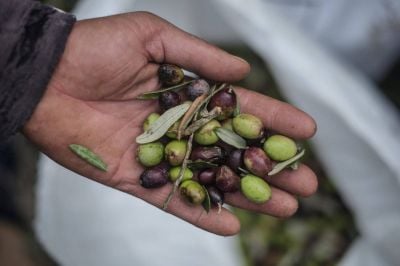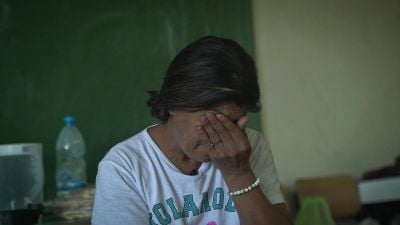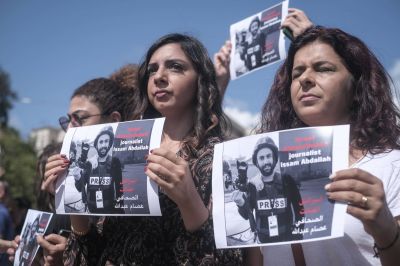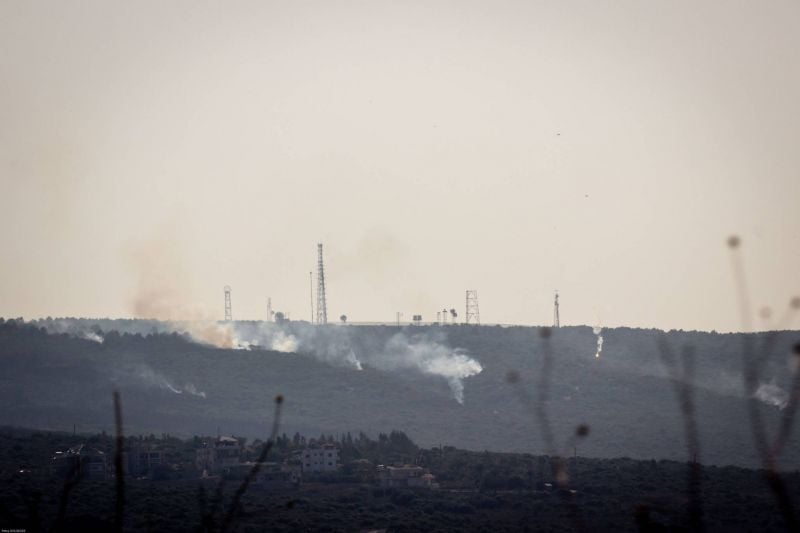
Wildfires break out after Israeli artillery fire and flares near the Lebanese border village of Alma al-Shaab, Oct. 28, 2023. (Credit: Philippe Pernot/L'Orient Today)
SOUR — In south Lebanon’s Sour, the war is both close and very far away. No missiles or bombs rock the ground here, making it a relatively safe haven for thousands of residents who have fled the ongoing clashes at the Lebanese-Israeli border.
Many of them have found refuge in the classrooms of the Tyre Technical University campus, where laundry and stacks of water bottles pile up next to chalkboards.
A group of young men from the border village of Dhayra sit outside in the setting sun, awaiting their daily food ration from NGOs. “We were working on the fields when the bombing took us by surprise,” they tell L’Orient Today, requesting anonymity. Now they can’t work, and rely on aid for food and shelter.
“Most of us are daily laborers who depend on the olive harvest and the fields. If we don’t work, we don’t eat,” explains Amis Sweid, also from Dhayra. “We were hit by white phosphorous while we were going to work on a tobacco farm. The Red Cross came and gave the injured people oxygen, and now, we’ve lost a season’s worth of salary,” his wife Zahia says.
Farms, olive groves and forests have been among the targets of deadly Israeli bombings for the past three weeks, ever since Hamas militants from Gaza launched their “Al-Aqsa Flood” operation against Israel.
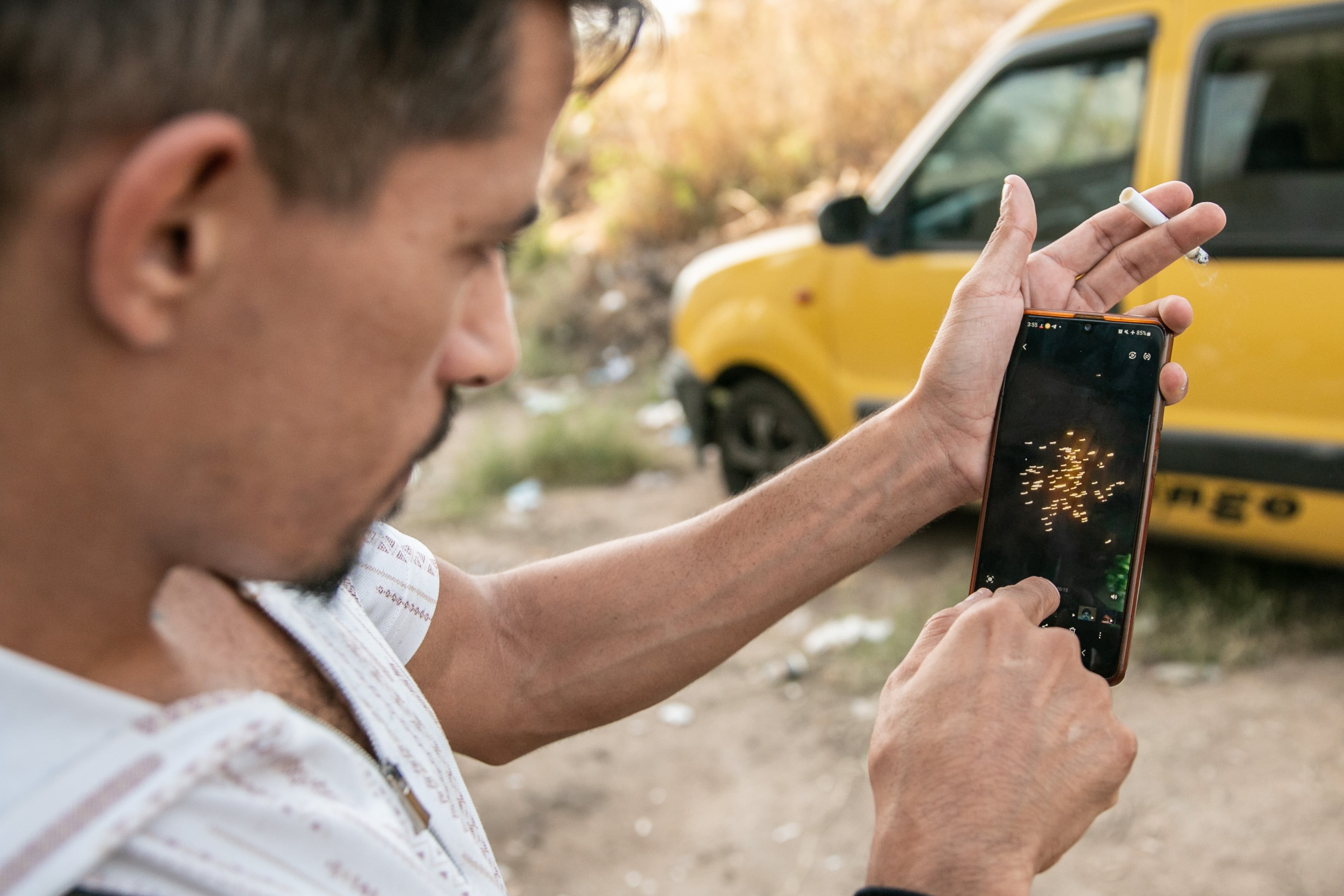 Saher, a hairdresser from Dhayra, shows pictures of an Israeli phosphorus bomb attack on Oct. 16 at the Tyre Technical School, Oct. 24, 2023. (Credit: Philippe Pernot/L'Orient Today)
Saher, a hairdresser from Dhayra, shows pictures of an Israeli phosphorus bomb attack on Oct. 16 at the Tyre Technical School, Oct. 24, 2023. (Credit: Philippe Pernot/L'Orient Today)
Thousands of olive trees burnt
Caretaker Agriculture Minister Abbas Hajj Hassan told AFP that his ministry found in a preliminary survey that "128 fires resulted from the Israeli enemy’s phosphorus bombing of our regions."
Banned internationally, white phosphorus is highly toxic to humans and can cause severe burns. It is also extremely flammable.
Hajj Hassan added in a statement Monday that Israeli forces have so far burnt more than 40,000 olive trees in southern Lebanon at the height of olive harvest season using internationally banned white phosphorus bombs.
“Here in Alma, they don’t bomb the civilians directly, but they destroyed our water tank, hit some houses, and want to burn everything,” says Msgr. Maroun Ghafari, parish priest of Alma al-Shaab, an agrarian border village surrounded by olive groves
“The wind blows in our direction, and the hot weather doesn’t help: the fires are extremely dangerous for the village,” he adds.
According to Ghafari, residents had to extinguish flames on their own for hours last Thursday before UNIFIL and volunteer firefighters came to help. “The Civil Defense are very brave, but there’s only so much they can do” amid the bombardment.
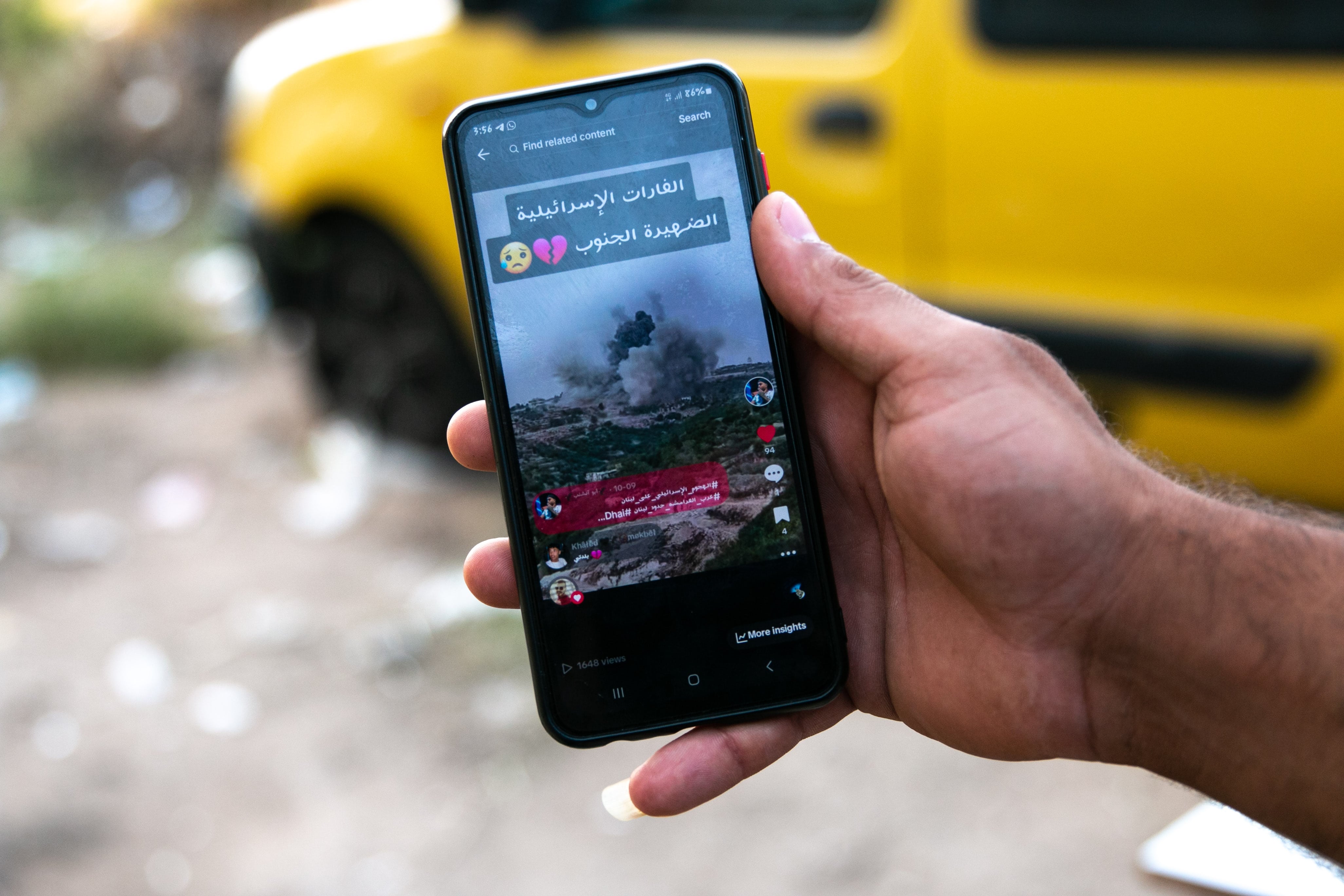 Saher, a hairdresser from Dhayra, shows pictures of an Israeli phosphorus bomb attack on Oct. 16 at the Tyre Technical School, Oct. 24, 2023. (Credit: Philippe Pernot/L'Orient Today)
Saher, a hairdresser from Dhayra, shows pictures of an Israeli phosphorus bomb attack on Oct. 16 at the Tyre Technical School, Oct. 24, 2023. (Credit: Philippe Pernot/L'Orient Today)
Nine firefighters have been wounded by Israeli shelling since the beginning of the conflict in Lebanon, a source informed on the firefighting efforts tells L’Orient Today, on condition of anonymity. He adds that 45,000 hectares of land were reduced to soot this past Saturday alone.
Ecosystems at the border face long-term damage
A new stage of the conflict in Lebanon erupted when the Zebqine valley was targeted last Saturday by Israeli shells, six kilometers from the border — whereas the strikes had until now been limited to a three-kilometer radius.
The preserved valley of green canopy is said to host secret Hezbollah positions but is also set to become a natural reserve thanks to the efforts of the Green Southerners, an environmental NGO. After six years of campaigning, their plan awaits a response from the government — but the war has left those efforts on hold, as the valley is unsafe due to the strikes.
“We cannot continue fieldwork and rewilding efforts there. Our role now focuses on monitoring ecological degradations,” explains Abbas Baalbaki, a researcher at the American University of Beirut (AUB) and member of the Green Southerners environmental NGO. “And there are many,” he adds.
The damages are potentially long-lasting, according to Baalbaki. “Chemical bombs and wildfires affect ecosystems [for] up to 70 years, can pollute water streams and soils, and poison the whole food chain,” he warns.
Baalbaki says he plans to sample bomb remains in order to study the exact composition of the white phosphorus used by Israel and determine its effects on the environment.
From the white phosphorus attacks to the wildfires, from the cluster ammunition to landmines, all the way to the oil spills of 2006 and 2021 – ecosystems in southern Lebanon have been paying a high price in the decades of war. “Israel is clearly weaponizing the environment in an effort to harm humans and wildlife alike,” Baalbaki accuses. “Why else would they use flares during daytime and white phosphorus on wild areas with no Hezbollah infrastructure?”
Ghafari echoes his sentiment. “Israel is deliberately setting fire to our crops and forests, using incendiary bombs, white phosphorus and flares,” he accuses.
“Even in the 2006 [war] they didn’t do this,” he adds, estimating that only a hundred inhabitants of the 1,000 usually living in the mostly Christian village of Alma al-Shaab have stayed behind, the rest fleeing elsewhere for safety.
Israeli forces have yet to publicly comment on their firing of incendiary weapons into southern Lebanon.
Either way, the fires continue to threaten the local ecosystem, Baalbaki says. “Who wants to live in a burnt wasteland?”
Workers, residents stay home on their land
Nevertheless, L’Orient Today finds a handful of agricultural workers outside in villages across the south, continuing the autumn vegetable harvest.
“What else can we do?” says Bilal, a Syrian fieldworker in his 30s, while he plucks lettuce outside one village. He requests L’Orient Today not publish his name, to protect his privacy. “Last week, there were big explosions and I fled as quickly as I could, but I came back a few days later as I needed to work,” he says.
He works on a strip of farmland a few kilometers away from the border where rows of avocado trees, lettuce, peppers and dozens of other vegetables grow beneath the constant rumbling of Israeli warplanes.
“My fields were hit last week, but they didn’t catch fire,” says local resident Nimr Atta, who owns the farmland where Bilal works. “It was a 120mm shell, not incendiary bombs,” he claims, showing pictures of the bomb remnants.
Atta says he owns 100 hectares of land and usually employs up to 25 workers – but now, only a handful are left.
He adds he’s lost not one, but two agricultural seasons to the bombs. “It’s an economic and social catastrophe for the region,” Atta sighs.
“I could never leave, my feet are deeply rooted here," says Ali, a local resident from Naqoura who lives off his cows, fishing and some farmland. He requested that L’Orient Today not publish his family name.
Because of the bombings, 35-year-old Ali says could not work in recent weeks; it has become dangerous to take his cattle out. Instead, he depends on his father’s UNIFIL pension.
“But it is getting hard, food is scarce, we have no electricity and not much water. My neighbor’s dog died of hunger last week,” Ali says.
Nearby, a street sign emblazoned with the word “Palestine” points in the direction of the border. There, the no man’s land along the Blue Line continues to burn and white smoke rises in the hot autumn sky.
